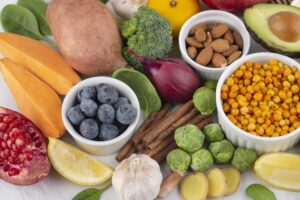Fermented foods have gained popularity in recent years due to their impressive health benefits and unique, tangy flavors. From tangy kimchi and miso to rich yogurt and kombucha, fermented foods are an integral part of many culinary traditions around the world. These foods not only enhance the taste of meals but also offer numerous health benefits, particularly for gut health, digestion, and immune function.
In this article, we’ll explore the fascinating world of fermented foods, why they’re beneficial for your health, and how you can incorporate them into your diet. Whether you’re a beginner looking to try your hand at fermentation or someone seeking new ways to include more probiotics into your meals, this guide will provide you with everything you need to get started.
What Are Fermented Foods?
Fermentation is a natural process in which microorganisms such as bacteria, yeast, or molds break down food substances, usually sugars, into alcohols, gases, or acids. This process not only preserves food but also enhances its flavor, texture, and nutritional profile. Many traditional cuisines feature fermented foods, as they were historically a way to extend the shelf life of perishable items before refrigeration was available.
Some well-known fermented foods include:
- Kimchi: A spicy, fermented Korean dish made from vegetables like napa cabbage, radishes, and scallions, often flavored with garlic, ginger, and chili peppers.
- Kefir: A fermented milk drink that is similar to yogurt but contains more diverse strains of probiotics.
- Sauerkraut: A fermented cabbage dish that is commonly found in German and Eastern European cuisines.
- Miso: A paste made from fermented soybeans, often used as a base for soups and sauces in Japanese cooking.
- Kombucha: A fermented tea that is bubbly and slightly sweet, known for its detoxifying properties.
- Tempeh: A fermented soy product originating from Indonesia, made by fermenting cooked soybeans into a firm, cake-like texture.
- Pickles: Vegetables such as cucumbers, carrots, and beets that are preserved in a brine solution.
These foods are typically rich in probiotics, which are beneficial bacteria that support gut health. Probiotics are essential for a balanced gut microbiome, which plays a key role in digestion, immune function, and even mental health.
Health Benefits of Fermented Foods
- Improves Gut Health: The most significant benefit of fermented foods is their impact on gut health. The probiotics found in these foods help to balance the gut microbiome, promoting the growth of beneficial bacteria while reducing harmful pathogens. A healthy gut microbiome is linked to improved digestion, reduced bloating, and fewer digestive issues like constipation and diarrhea.
- Boosts Immune Function: Approximately 70-80% of the body’s immune system is located in the gut. By supporting a healthy gut microbiome, fermented foods can improve immune function and help prevent infections. Probiotics can also help modulate inflammation, which is key in preventing chronic diseases and boosting overall immunity.
- Enhances Nutrient Absorption: Fermentation can increase the bioavailability of certain nutrients in foods, making them easier for the body to absorb. For example, the fermentation of grains and legumes can reduce the levels of phytic acid, an inhibitor of mineral absorption. As a result, fermented foods like sourdough bread and tempeh can offer better mineral absorption, particularly for calcium, magnesium, and iron.
- Improves Digestive Health: Fermented foods are rich in enzymes that aid in the breakdown of food, making digestion easier. These enzymes help break down complex carbohydrates and proteins, which can reduce digestive discomfort, especially in individuals with sensitivities to certain foods. Fermented foods can also help restore balance to the gut microbiome after a course of antibiotics, which can disrupt the healthy bacteria in the gut.
- Promotes Mental Health: Emerging research suggests a strong connection between the gut and the brain, often referred to as the “gut-brain axis.” A healthy gut microbiome has been linked to improved mood, reduced anxiety, and even better cognitive function. Probiotics in fermented foods may play a role in regulating mood and mental well-being, making them a natural way to support mental health.
- Helps with Weight Management: Fermented foods are often low in calories yet packed with nutrients, making them an excellent choice for anyone looking to maintain a healthy weight. The fiber content in fermented vegetables like kimchi and sauerkraut can help with satiety, reducing the likelihood of overeating. Additionally, the probiotics in fermented foods can help regulate appetite and reduce fat storage.
How to Incorporate Fermented Foods into Your Diet
Incorporating more fermented foods into your diet doesn’t have to be difficult or time-consuming. Here are some simple ways to get started:
- Start with Store-Bought Ferments: If you’re new to fermented foods, it’s best to start with pre-made options from the store. Look for organic, unpasteurized versions of kimchi, sauerkraut, and kombucha to ensure they contain live probiotics. You can add these to your meals as condiments, side dishes, or snacks.
- Make Your Own Fermented Foods: Making fermented foods at home is a fun and rewarding process. Fermentation requires just a few basic ingredients, such as vegetables, water, salt, and sometimes spices. There are numerous resources and tutorials available online to help you start fermenting your own foods. Common homemade fermented foods include sauerkraut, kimchi, pickles, and fermented hot sauces.
- Incorporate Fermented Foods into Your Meals: The great thing about fermented foods is that they can be easily added to a variety of meals. Use kimchi as a topping for rice bowls or tacos, mix sauerkraut into sandwiches or salads, and add kefir or yogurt to smoothies. You can even incorporate fermented grains, like tempeh, into stir-fries, salads, and grain bowls.
- Experiment with Fermented Beverages: Fermented beverages like kombucha, kefir, and water kefir are a great way to enjoy the benefits of fermentation while staying hydrated. These drinks can be found at most health food stores, or you can make them yourself at home. Kombucha comes in a variety of flavors, from fruity to herbal, and can be enjoyed as a refreshing alternative to sugary sodas.
- Pair Fermented Foods with Other Whole Foods: Fermented foods are often nutrient-dense and can be paired with a variety of other healthy foods to create balanced meals. For example, add fermented vegetables to a grain bowl with quinoa, avocado, and roasted veggies, or enjoy kefir with fresh fruit and granola for a nutritious breakfast.
Simple and Delicious Fermented Food Recipes
- Homemade Kimchi:
- Ingredients: 1 napa cabbage, 3 tablespoons sea salt, 1 tablespoon grated ginger, 3 cloves garlic (minced), 2 tablespoons gochugaru (Korean chili flakes), 1 tablespoon fish sauce (or tamari for a vegan version), 2 tablespoons sugar.
- Instructions: Cut the cabbage into bite-sized pieces and toss with sea salt. Let it sit for 4-6 hours to release moisture. Rinse and drain the cabbage. In a bowl, mix ginger, garlic, gochugaru, fish sauce, and sugar to make the paste. Massage the paste into the cabbage. Place the mixture into a jar and let it ferment at room temperature for 3-5 days, checking daily for desired sourness.
- Homemade Sauerkraut:
- Ingredients: 1 medium green cabbage, 1 tablespoon caraway seeds (optional), 1-2 tablespoons sea salt.
- Instructions: Slice the cabbage thinly and sprinkle with salt. Massage the cabbage with your hands for about 5-10 minutes to release its juices. Pack the cabbage into a sterilized jar, pressing down firmly as you go to ensure the cabbage is submerged in its own liquid. Cover the jar with a cloth and let it ferment at room temperature for 7-14 days, tasting periodically to check for the right level of tanginess.
- Kefir Smoothie:
- Ingredients: 1 cup kefir, 1 banana, 1/2 cup frozen berries, 1 tablespoon chia seeds, 1 teaspoon honey (optional).
- Instructions: Blend all ingredients until smooth. Pour into a glass and enjoy as a nutrient-packed breakfast or snack.
- Kombucha:
- Ingredients: 1 SCOBY (Symbiotic Culture of Bacteria and Yeast), 1 cup sugar, 8 cups water, 6 black tea bags, 1 cup starter tea (from previous batch of kombucha or store-bought).
- Instructions: Boil the water and steep the tea bags. Add sugar to the hot tea and stir until dissolved. Let the tea cool to room temperature. Pour the tea into a sterilized glass jar, add the starter tea, and gently place the SCOBY in the jar. Cover with a cloth and secure with a rubber band. Let it ferment for 7-10 days, then taste it. Once it reaches the desired flavor, bottle it and refrigerate.
Conclusion
Fermented foods are a wonderful addition to any diet, providing a wide range of health benefits, from improved gut health and digestion to enhanced immune function and mental well-being. With a variety of flavors and textures to choose from, fermented foods can elevate your meals and make eating more exciting. Whether you buy them pre-made or try making your own at home, there’s no shortage of delicious and nutritious fermented foods to explore. Start incorporating them into your meals today and reap the rewards of a healthier, more balanced gut!






